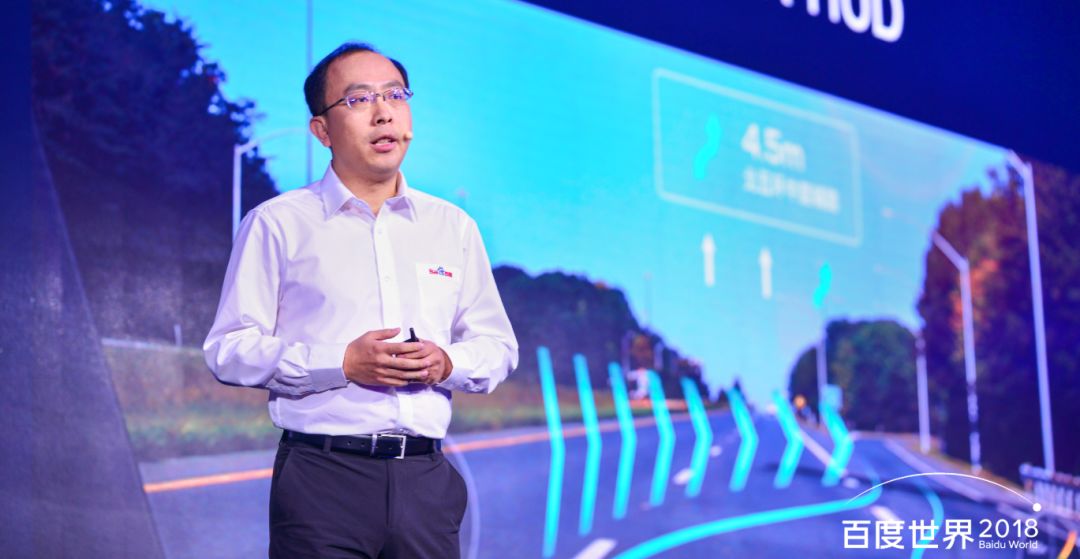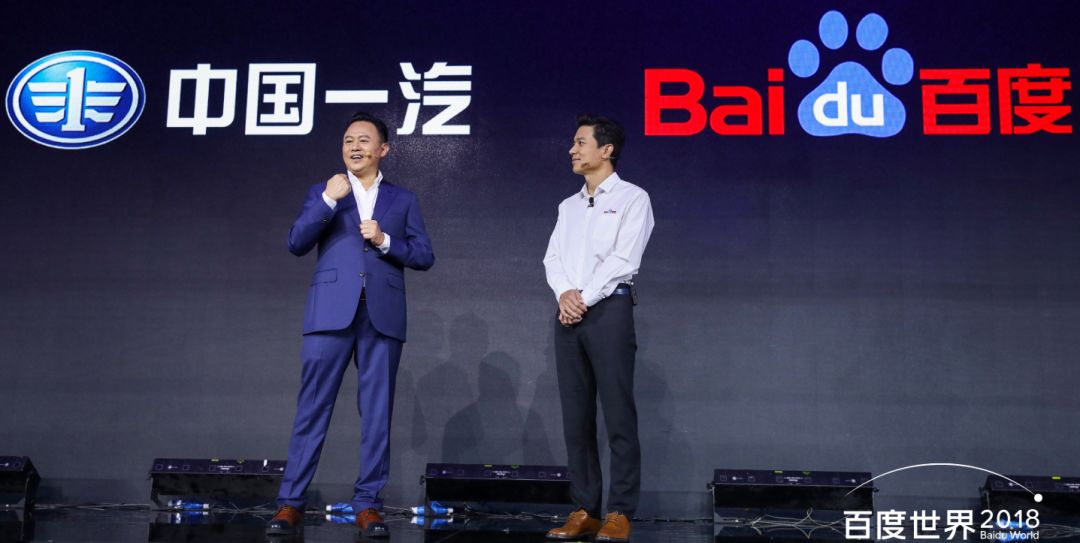Today’s topic is Baidu, or more specifically, Apollo, the self-driving open platform from Baidu that was initially not well received in the industry.
On April 19, 2017, Lu Qi, the former COO of Baidu and general manager of Baidu’s Intelligent Driving Group, launched the Apollo self-driving open platform at the Shanghai Auto Show. A year and a half later, Baidu has accomplished a lot, prompting more contemplation from industry professionals.
First, here are the key announcements today:
- Baidu announced a collaboration with FAW to launch a “L4 level autonomous production passenger car” based on the Hongqi platform. Baidu’s founder Li Yanhong and FAW party committee secretary Xu Liuping made the announcement.
- Baidu announced a collaboration with Volvo. The CEO of Volvo Car Group, Håkan Samuelsson, announced that Volvo will join Baidu Apollo to launch a “deep customization plan for L4 level autonomous passenger cars with mass production as the goal.”
- Other upgrades include self-parking, highway autonomous driving, AR-HUD, high-precision maps, and information security.
Now let’s delve deeper into these announcements. First, the production passenger car that Baidu is collaborating with FAW to produce may not look “production-ready” at first glance. After all, who would want sensors protruding from their car like Tesla’s?
However, Waymo has been operating a self-driving taxi service in Phoenix, Arizona for over a year, with a full array of sensors. So if it’s for commercial operation purposes, then the styling is not an issue.
Additionally, if you are a self-driving professional, take a closer look at the sensor combination: four sets of cameras and Velodyne’s latest 128-line LiDAR. The layout has also been modified since Baidu’s second-generation sensor plan at the end of last year. This new production-oriented plan is entirely logical.
Translation
To speak of an independently developed car being equipped with a 128-line LiDAR, would it be possible for a Chinese automaker to take the lead in the industry? That is impossible. When 64-line LiDAR was in short supply last year, many universities and start-ups developing self-driving cars were in trouble, since Velodyne monopolized the market. Needless to say, there will be even more difficulties with the next-generation 128-line products.
Baidu has never had this kind of distress because Baidu joined hands with Ford in August 2016 to invest $150 million each in Velodyne. As a result, Baidu has always been Velodyne’s priority supplier.
According to Xu Liuping, the car will be launched for demonstration operation in small batches in 2019, and mass-produced and launched in more cities in 2020. We’ll see about that.
Turning to Baidu and Volvo in comparison to the international partner BMW, which was announced by the CES Asia about connected vehicles, it seems that Volvo is inferior to Baidu concerning L4 Level automated driving cars.
Consider the following actions of Volvo in the field of automated driving:
- In August 2016, Volvo collaborated with Uber and invested $300 million in developing automated driving on the SPA platform.
- In June 2017, Volvo reached a collaboration agreement on the R&D of automated driving cars with the top-tier supplier Autoliv and the automated driving chip supplier Nvidia.
It can be said that Volvo’s investment in automated driving is greater than that of some larger car manufacturers. Volvo found a partner in Baidu, and “as part of the future three-year plan for technology and model planning, Baidu will be deeply involved in designing, R&D, and he delivery of self-driving car functions, interactions and integration solutions.” This level of involvement goes far beyond just watching from the sidelines.
Note the wording “the next three years,” which ends in 2021, the self-driving year when almost all large automobile groups, starting from 2016, designated a five-year plan to achieve mass production of self-driving cars.
In my view, Volvo elevates Baidu to a significant partner status, but of course, other international leading automated driving research and development enterprises, such as Uber, Autoliv and Nvidia, will give Baidu some pressure as well. Conversely, this will force Baidu to accelerate technological innovation. Officially, Baidu will “lock in the most excellent collaborative technical resources from Volvo in China for a long time.” If Baidu cannot keep pace, Volvo will naturally look for other partners.
 The last part includes autonomous valet parking, high-speed autonomous driving, AR-HUD, high-precision maps, and information security, many of which are product lines that Baidu has been laying out, and are things that Baidu’s competitors in the automobile industry are also doing. For example, many autonomous driving startups are working on autonomous valet parking and high-speed autonomous driving, Alibaba’s Banma is working on AR-HUD, and Gaode Map is working on high-precision maps.
The last part includes autonomous valet parking, high-speed autonomous driving, AR-HUD, high-precision maps, and information security, many of which are product lines that Baidu has been laying out, and are things that Baidu’s competitors in the automobile industry are also doing. For example, many autonomous driving startups are working on autonomous valet parking and high-speed autonomous driving, Alibaba’s Banma is working on AR-HUD, and Gaode Map is working on high-precision maps.
For Baidu, it has accumulated many of the technologies needed for these products, so there is not much pressure to meet the high technological demands of commercialization. As a Baidu executive said, the significance of developing these products is that Baidu has built the broadest product matrix in the automobile industry in China, which can meet the needs of car manufacturers to the greatest extent possible. This is Baidu’s motivation.
Is there anything else? Yes, there is.
Baidu’s autonomous driving bus Apollo has run more than 10,000 kilometers with more than 10,000 passengers in limited scenarios.
Baidu expects that by 2019, 10,000 units of its Apollo brand of new autonomous driving products, such as unmanned logistics vehicles and street sweepers, will be deployed.
On the day before the Baidu World Conference, Ford announced that it would deepen its cooperation with Baidu and launch a two-year joint test project for L4-level autonomous driving.
On the day before that, Baidu reached a cooperation agreement with the Changsha municipal government to build a “demonstration city for autonomous driving and vehicle-road coordination innovation,” expecting to have a fleet of 100 autonomous taxis on the road in 2019.
…
18 months ago, when Robin Li announced the launch of the Apollo platform, I wrote an article that cautiously viewed the platform optimistically, for the following reason: From Li Yanhong to Lu Qi, who has now left the company, to Chairman Zhang Yaqin, and Li Zhenyu, general manager of the Intelligent Driving Business Group, I’ve heard them use the term “structural advantage” no less than 10 times.
What is a “structural advantage”?
At the national level, China’s top-level design recognizes that autonomous driving will trigger a transformation of the transportation industry, greatly improving efficiency. Therefore, it will pay special attention to guiding and encouraging the development of relevant enterprises from the perspective of policy formulation. The Apollo platform, which Baidu has invested in continuously since 2013, has become a national-level open innovation platform for autonomous driving designated by the Ministry of Science and Technology, thanks to its accumulating achievements in the area. This is a “policy advantage” possessed by Baidu.Secondly, the difference between domestic and foreign markets. Before, Lu Qi pointed out in an interview with Wired that there are 250 automobile OEMs in China, and none of them have the ability to independently develop autonomous driving vehicles, which is completely opposite to the highly centralized market in Europe and the United States. Automakers need Baidu, which is the market space for open platforms.
Thirdly, in terms of the Chinese autonomous driving field, Baidu is also the earliest and largest company to invest, and its technical capabilities are naturally leading. Today, Baidu Apollo has opened multiple platforms such as data, perception, safety, simulation, hardware development, and vehicle management; densely layout capital in the upstream and downstream of the autonomous driving industry chain; and has a sound development tool in the developer center, which belongs to Baidu’s post-efforts. At the Baidu AI Conference, there were only 70 ecological partners, and now there are close to 131, nearly doubled. These later participants have joined for a reason.
So when will Baidu fail in the automotive industry? With policy and market advantages, of course, the wavering attitude of the management is a possible hidden danger. Therefore, when Lu Qi announced his departure from Baidu, it did attract a lot of attention. Fortunately, at the Baidu AI Conference shortly thereafter, Robin Li came out to reassure that “Baidu will continue to follow the established strategy and promote the openness and commercialization of Apollo.”
The development of Baidu Apollo to today has made the previously established advantage sustainable. Coincidentally, both Alibaba and Tencent have significantly increased the importance of their intelligent automotive business strategies this year. What I want to say is that I hope everyone will work harder.


- After 441 days of intensive study, a more active and open Baidu Apollo 3.0 debuts* In addition to its collaboration with BMW, Baidu also showcased a more grounded Apollo | CES Asia in Shanghai

This article is a translation by ChatGPT of a Chinese report from 42HOW. If you have any questions about it, please email bd@42how.com.
